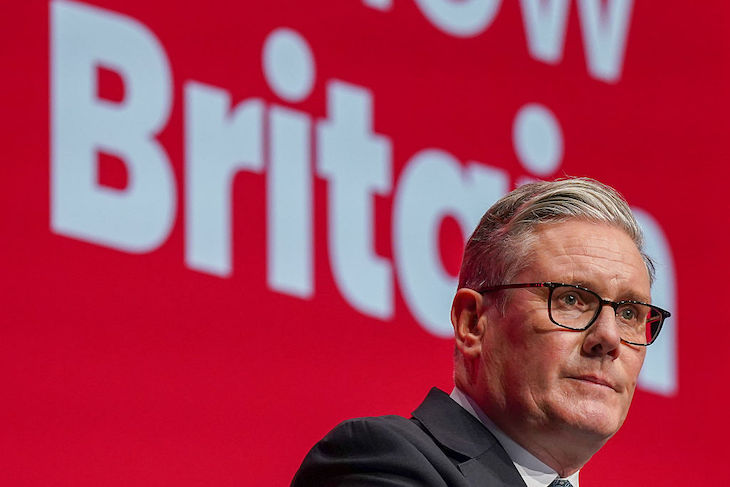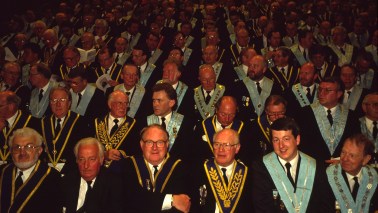The consensus before Keir Starmer’s speech to the Labour party conference was that he needed to make ‘the speech of his life’. He did so. It was not the greatest conference speech I’ve seen, far from it, but it was the best Starmer has made and not because it was shot through with content. However, it had an argument, it laid out a narrative and some dividing lines for British politics over the next four years and it went much further than before to tell us both what Starmer is for and what he is against. In that sense it was an unlikely triumph, popular in the hall and one which lays to rest, for a few months at least, whether Starmer should continue as Prime Minister.
The leadership question will pass into abeyance but it is likely to rear its head again after May’s local elections
This week has reminded me in many ways of numerous Labour conferences during the Blair-Brown era, when Brown was hailed as tribune of the left and the grassroots, the voice of ‘real Labour’ against the regrettable compromises of power which Blair represented. Every year, Brown turned up on the Monday of conference, growled his tonal (though never actual) dissent from his senior partner in the New Labour team and took the house down. Cue yet more leadership speculation. On the Tuesday, Blair would make a speech of greater oratorical range, making even those regrettable compromises attractive to the activists in the hall and silence any such speculation.
Starmer did not rise to those heights today, but he borrowed from both Brown and Blair to vanquish the ghost of Andy Burnham, who had scuttled away from conference just before Starmer took to the stage having performed a farcical parody of the Brownite grandstanding of years past. Blair and Margaret Thatcher were largely fortunate in their enemies and the glee in the faces of the Starmtroopers this week at Burnham’s abortive grandstanding was very apparent. A senior Labour figure close to the Prime Minister joked: ‘We were very lucky that our secret agent Burnham was prepared to go undercover for us in this way.’ A former cabinet minister pronounced the mayor of Manchester ‘a clown’.
Politics is a rough old trade, but Burnham shot at the king with no apparent plan to secure a seat or oust Starmer – and consequently missed. As one indecorous individual put it: ‘Poor Andy. He shot his bolt during the foreplay.’ That this farce distracted the media from the genuine disquiet which ministers, MPs and activists feel about the government was a godsend for the PM.
Starmer’s speech borrowed from Blair in that he set out his position and then painted those to the left and to the right of him as extremists who do not understand the world and are unpatriotic.
He borrowed from Brown in a section halfway through listing all Labour’s achievements to date, a section which was delivered with gusto and momentum and built to the biggest standing ovation of the day.
‘This is no time for dividers,’ he said, having a pop at Nigel Farage with an echo of Brown’s ‘no time for a novice’, which was aimed at David Miliband.
The PM did not shy away from Britain’s problems but he also tried to map out where the ‘programme of renewal’ he has long championed would lead – to ‘a new country, a fairer country, a land of dignity and respect…a Britain built for all’. Tough decisions would be needed, ‘but I make no apology if they tilt towards working people’. Alan Milburn, the former health secretary, rather pithily summed this up as ‘One Nation Labour’, parking his tanks firmly on lawns which used to be occupied by the left of the Tory party.
The other purpose of the speech was to seize patriotism for the centre, painting Farage and Reform on the one hand and the Corbynite rump as ‘snake oil merchants on the right and the left’ for whom ‘decline is good for business’.
‘When was the last time you heard Nigel Farage say anything positive about Britain?’ he asked. ‘He doesn’t like Britain, he doesn’t believe in Britain, so he resorts to grievance.’ Rounding on Reform’s plans to deport those granted indefinite leave to remain, Starmer said: ‘If you say or imply that people who have lived here for generations can’t be English because of the colour of their skin, people who made their lives here…you’re the enemy of national renewal.’
Along with ‘a Britain built for all’, the phrase Starmer will hope is ringing in voters’ ears is ‘politicians of grievance’. Drawing the battle lines for the election, which Labour strategists expect to be between Labour and Reform, Starmer offered Tory voters an olive branch to back him over Farage. ‘If you are a patriot and you want to stand against grievance this is your fight too.’ Indeed, Starmer was careful not to include senior Conservatives in his roll call of grievance peddlers, saying only that the Tories failed to ‘stand up to’ them.
But there were tough messages for his own party too. He hailed Britain’s place as a haven for genuine asylum seekers, but warned: ‘The British people are not unreasonable. They want secure borders… Secure borders are also vital for a decent compassionate country.’ Labour placed ‘too much faith in globalisation’ and ignored those who were uneasy about it with a mantra that ‘immigration is all we need to get us workers’. The global financial crisis of 2008, he said, was ‘when a new nation should have been born’. This led Labour to ‘patronise working people’.
In a pop at Burnham’s calls for more borrowing, Starmer said: ‘I acknowledge the temptation, the desire to ignore reality, cast off the restraints and indulge…It doesn’t matter if it’s unfunded tax cuts or unfunded spending, I will never let that happen again. A Labour party that cannot control spending cannot govern in this time.’ Rachel Reeves’s fiscal rules are ‘non-negotiable’, adding: ‘This is not a game.’
Starmer also thanked business for paying more tax since the last budget (‘we asked a lot of you’) but offered no hope of reductions in corporate taxation. ‘Because of your contribution we’ve taken a step on the path of renewal.’ He argued that improving the public services and getting the finances under control, a ‘more muscular state’ would be ‘better for growth’ in the long term. He claimed that ‘public investment does not crowd out private’, and that ‘stronger workers’ rights will be better for productivity’. This is, to put it politely, unproven and clashes with his restated ‘defining mission’ to ‘grow the economy’, but it was consistent with his approach of painting those either side of him as wrong.
Politics is a rough old trade, but Burnham shot at the king with no apparent plan to secure a seat or oust Starmer
Starmer sought to reclaim the British and English flags from racists (‘they belong to all of us’), but also warned that those who paint the flag of St George outside a Chinese takeaway with ‘go home’ are racists. He backed protest but said: ‘If you throw bricks and smash up private property that is not legitimate, that is thuggery…Free speech is a British value but if you incite racist violence and hatred that is criminal.’
The two policies announced were to introduce electronic appointments in the NHS and to scrap the Blairite goal of sending 50 per cent of young people to university, in favour of two-thirds of 18-year-olds either going to university or a ‘gold plated apprenticeship’. There were also hints that the two child benefit cap will go. Discussing Labour’s longstanding goal to reduce child poverty he said: ‘We have walked that road before and we will walk that way again.’
There were sections which were frankly a bit rich. Starmer spent a long section denying that ‘Britain is broken’, a riposte to Farage’s assertion that little works. Many voters will recall that a year ago it was Starmer telling us he has inherited a broken country from the Conservatives. There are also dangers with this approach. One pollster I bumped into afterwards made the point that most voters do think things are pretty screwed and seriously doubt the ability of government to transform Britain.
Starmer’s delivery was more energetic than usual and he seemed genuinely passionate at times, rather than (as often in the past) an adenoidal robot who has been told to be passionate. There were a few tonal issues. Some of his material extolling the diversity of Britishness from ‘the swagger of Oasis’ to ‘oranges at half time’ veered into the realms of David Brent or the Fast Show’s ‘jumpers for goalposts’, but that was forgiveable because it was in aid of his main argument.
Credit for that goes not just to Alan Lockey, Starmer’s speechwriter, but to two of the Prime Minister’s team who have just departed: Paul Ovenden and Steph Driver. Those two and Lockey went to Chequers at the start of summer and agreed on a strategy that pitched the key dividing line as ‘national renewal with Labour vs. decline with others’ and stressed that Starmer needed to be truly patriotic. Starmer had written pages and pages of hand-written notes. Lockey wrote the first draft. He, Ovenden and Stuart Ingham, Starmer’s longest serving aide went back and forth on the edits with Starmer.
Huge questions remain. It is still unclear how Reeves is going to balance the books in the budget, though there have been hints in the last week that the manifesto pledges not to touch income tax and VAT might be thrown in the dustbin. Around £10 billion could be had by freezing the threshold at which people pay the higher 40p rate of income tax. But most of the shrewder people I’ve spoken to in the last week think raising the rate of income tax is the fairest way to get extra cash – perhaps with a cut in VAT, which will disproportionately benefit the less well off. Could Starmer sell such a rise-cut strategy? After today it’s at least possible to see that he might try on the basis of a Britain built for all.
The Tories will be delighted if things go as well for them next weekend
The leadership question will pass into abeyance but it is likely to rear its head again after May’s local elections. Wes Streeting, the Health Secretary, kept his name in the conversation with a confident speech before Starmer, which also took aim at Farage. With Burnham’s position as the soft left tribune perhaps becoming vacant, Streeting also praised Angela Rayner, which was either a nice way of acknowledging a fallen comrade, or a cynical way of hoovering up her support, depending on how jaded you are. (I’m pretty jaded).
But the performance of the week remains that of Shabana Mahmood, the new Home Secretary, who managed to sell a tough migration message to conference and delivered a nearly word perfect performance in conversation with Michael Gove on Monday evening. She suggested that Starmer was wrong to call Nigel Farage’s plan for masss deportations racist, painting it as an even more pernicious intervention than that. ‘I actually think it’s a little bit worse than racist,’ she explained. ‘I think it’s immoral and it’s extreme.’ Mahmood accused Farage of ‘playing the trick he likes to play’ by saying something which cannot be labelled racist, while ‘blowing a very loud dog whistle to every racist in the country’. She also spoke movingly about being called a ‘f***ing Paki’ in her youth.
One Labour constituency party chairman gushed that her platform speech was ‘the most important’ of the week. She dealt effectively with hostile questions on the proscription of Palestine Action and an awkward question on cousin marriage. She admitted the Home Office is ‘a work in progress’ before it is fully fit for purpose. A leading Tory Brexiteer present, now a PR man, conceded that she was ‘bloody good’.
Labour has had a turbulent week. But it is possible they are now emerging with an argument, a slightly bolstered leader and even a couple of viable successors. The Tories will be delighted if things go as well for them next weekend.








Comments